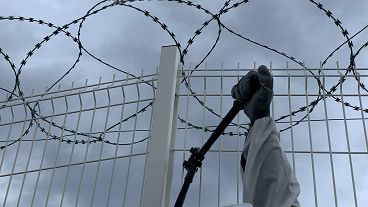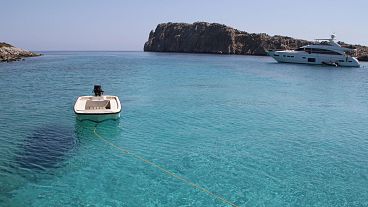Allez les bleus: How are French and English football teams cutting down on carbon emissions?
France’s football teams will travel to all matches under three hours away by train instead of plane in a bid to cut carbon emissions.
The country’s football federation announced the new policy, which applies to all national sides, last week.
But it will take a bit longer to implement for the men’s senior team, as the Fédération Française de Football (FFF) ponders the logistics of public transport for global stars like Kylian Mbappé.
"With [manager] Didier Deschamps, we're looking into the possibility of our France senior team travelling by train for the matches in Lyon in March, to ensure that our France team sets a good example and highlights a policy of ecological transition that we support,” FFF president Philippe Diallo said on Thursday.
The policy is already in place for the women’s team and the under-21s, coached by Thierry Henry.
French football travel policy follows national plane ban
It’s a welcome example in a world where sporting fixtures can generate a hefty amount of carbon emissions. The ICC Men’s Cricket World Cup currently taking place in India, for example, involves around eight flights for the teams to different city venues.
So many, in fact, that it poses a problem for some tall fast bowlers, who get cramped in regular plane cabins.
France has already set the example on a national level, however, by banning short-haul domestic flights earlier this year.
Under the country’s new environmental laws, domestic flights are banned if the journey can be made in under two-and-a-half hours by rail.
But that rule doesn’t apply to private planes, leading to some notoriously speedy flights. Last year France’s Paris-Saint-Germain found themselves in hot water after taking a plane from Paris to Nantes - a measly 380km.
The FFF is aware that transporting the French A men’s team by rail poses some challenges.
"There are questions of security and questions relating to the comfort of other passengers. If we put the French team tomorrow at Lyon station, it is possible that there will be crowds and that the trains don't leave on time,” said Diallo.
"That's why I mentioned March, we gave ourselves time, with the managers of SNCF, the French team, the FFF and the public authorities to study all facets."
English football teams are catching trains too
Just like bedbugs, sustainable transport is catching on across the Channel too.
The Football Supporter’s Association (FSA) and clubs from the English Football League (EFL) recently launched a Sustainable Travel Charter.
Clubs including Bristol City, Forest Green Rovers, Millwall and Swindon Town have signed up for the initiative which encourages teams to travel by coach or train.
Earlier this year, BBC research found evidence of 81 individual short-haul domestic flights made by Premier League teams to and from 100 matches over two months. Some were as short as 27 minutes.
“Football clubs’ reliance on short-haul flights is a thorn in the side of their wider sustainability strategies,” says Katie Cross, CEO of Pledgeball, a football charity which co-created the charter.
“This Charter seeks to address the elephant in the room and help clubs incorporate more sustainable travel practices into their operations and lead by example in showing fans and the public that climate action means walking the talk.”
Great Western Railway (GWR) says it is on hand to support the logistics of more teams taking the train.
“We have a specialist sales team ready to assist football clubs seeking to travel by train, which as we all know is a far more environmentally friendly form of transport,” says GWR Exclusive Sales Manager, Sarah Hind.
Earlier this year, rock superstars The Foo Fighters made headlines by choosing GWR to take them to Glastonbury Festival, the train company points out, proving that celebrities of all stripes can set an example.



